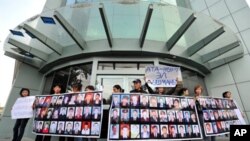On Sunday, three months after ethnic tensions in Kyrgyzstan exploded into a conflict that left hundreds dead, voters are to select a new parliament to create Central Asia's first parliamentary democracy.
But in the southern city of Osh, where much of the killing unfolded, residents are still trying to put their lives back together.
For example, it took two months for the Kyrgyz-controlled City Hall to allow ethnic Uzbeks to clear debris from their burned out homes. Rebuilding is slow and as winter approaches, people are living in tents. A new pane of glass or a freshly laid brick is a rate sight.
Ethnic-Uzbek shopkeeper Khamid Badalov says his family has lived in Osh for generations. He wants to rebuild for his wife and three children, but has nothing left. Everything burned down except his shirt and trousers, says Badalov. Everything he owned and all the money is gone.
Uzbeks struggle or flee
With the army and police composed almost entirely of ethnic Kyrgyz, the Uzbeks were the losers in what people in Osh now call simply ''the war.'' Army and police units were seen supporting armed groups of Kyrgyz civilians.
The Kyrgyz must be disarmed, otherwise there will never be peace, says unemployed Uzbek construction worker Pazyklov Bokhodir. As he speaks, a neighbor approaches to show a foreign reporter photos of the bodies of her two adult sons. Koraboeva Ehtibar says her sons were defending the neighborhood last June, when they were shot by Kyrgyz snipers posted on Suleiman Hill, normally a city tourist attraction.
Now there are reports that young Uzbek men are going to Tajikistan for weapons training. Eager for revenge, they are easy recruits for the Islamic Movement of Uzbekistan, a religious fundamentalist group.
For young men, little holds them in southern Kyrgyzstan. Thousands of ethnic Uzbeks, the wealthiest and best educated, left Osh this summer, largely for Russia, where they can work without visas.
One English-speaking ethnic Uzbek, who asked not to be identified, is applying for asylum in Canada, saying "Most of my friends have left Kyrgyzstan since July and August. On Sunday my best friend left to Russia, to Moscow, where he went to start a new life."
With the ethnic Uzbek elite gone, working class Uzbeks find that Kyrgyz will not hire them. Bokhodir, who has worked as a construction worker across the Soviet Union, says discrimination is now the rule in Osh.
Kyrgyz grieve losses
From the other side, ethnic Kyrgyz like Talas, a lawyer, say the Uzbeks historically profited at the expense of Kyrgyz. Of 40 restaurants in Osh, says Talas, 35 were owned by Uzbeks, of 40 luxury cars, 35 were owned by Uzbeks, of three story houses, most were owned by Uzbeks.
Many Kyrgyz say the outside world overlooks their losses in "the war."
Kyrgyz activist Abdieva Turgunai showed VOA photos of 269 bodies she says are Kyrgyz victims of the June violence.
Pointing to one, she says "He was a good businessman. They knew that he lived in good conditions and so they killed him, their own neighbor. And they burned down his three-story house. And they wrote 'Kyrgyz are rags.'"
But Turgunai is confident of Kyrgyz control in Osh.
While she talks, a crowd gathers outside city hall to back Mayor Melis Myrzakmatov, a Kyrgyz nationalist politician who has closed Uzbek-language media outlets, blocked the arrival of European police observers, and slowed the rebuilding of Uzbek neighborhoods.
Dim hopes for reconciliation
Past bloodletting and today's polarization do not make for an easy political future for Kyrgyzstan.
Ethnic Uzbek journalist Alisher Khamidov is not optimistic.
"We will not have a legitimate parliament. We do not have an effective judiciary that could resolve electoral disputes. What we have is a sea of arms, weapons, guns in the hands of ordinary people so my concern is that the electoral disputes that we might witness during the October election may spill over may provide an avenue for these various political forces to clash," Khamidov says.
After this interview, Khamidov left Osh for the United States and applied for political asylum. Last week in Bishkek, an independent commission studying the violence said a new outbreak of ethnic fighting "is a highly probably scenario.''
Related video report











